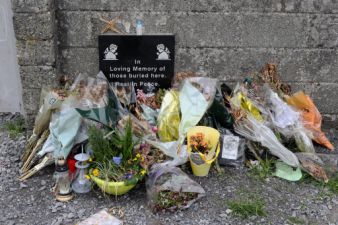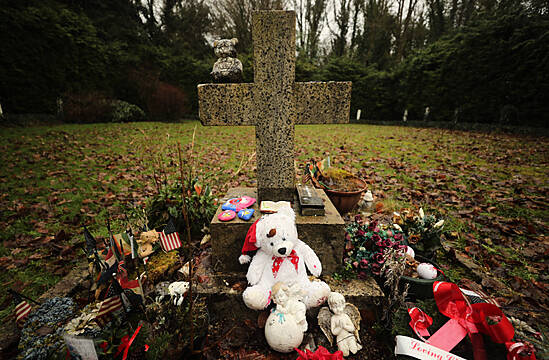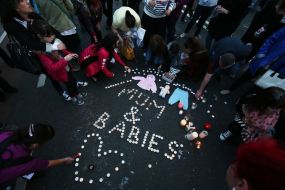The Government has published the final report of the Commission of Investigation into Mother and Baby Homes.
It details an oppressive and misogynistic culture that stigmatised unmarried mothers and their children for decades.
Many of the mother and baby homes were run by religious organisations from the 1920s to the 1990s.
Taoiseach Micheál Martin said the report describes “a dark, difficult and shameful chapter of very recent Irish history”.
Here are some key findings from the commission's five-year-long investigation, which covered 18 institutions where young pregnant women were hidden from society.
Child deaths
The commission said the high rate of infant mortality was a “disquieting” feature of mother and baby homes.
Approximately 9,000 of the 57,000 babies born in the homes died, about 15 per cent.
In Bessborough in Co Cork, 75 per cent of all babies admitted to or born in the home during the course of 1943 died in infancy.
The report found little evidence that politicians or the public were concerned about children in the homes, despite the “appalling level of infant mortality”.
Misogyny and abuse
There were about 56,000 unmarried women and girls in the mother and baby homes and county homes investigated by the commission.
More than 5,600 girls aged under 18 were in the homes, with some as young as 12 years old.
Some pregnancies were the result of rape; some women had mental health problems, others had an intellectual disability.
The commission said many of the mothers were destitute with their lives blighted by misogyny after failing to secure the support of family and the father of their child.
Read more: 9,000 children died amid 'appalling' infant mortality
Read more: Timeline of the commission's findings
Read more: Reaction from survivor groups
It found no evidence that women were forced to enter the homes by the Church or State but that most had “no alternative”.
Many suffered emotional abuse in the homes and were often subject to denigration and derogatory remarks.
However, the report made no findings of widespread physical abuse despite a number of testimonies of beatings and brutality.
The report said responsibility for the harsh treatment of the unmarried mothers lies mainly with “their own immediate families”, though it was “supported by, contributed to, and condoned by, the institutions of the State and the churches.”
It said: “However, it must be acknowledged that the institutions under investigation provided a refuge – a harsh refuge in some cases – when the families provided no refuge at all.”

Appalling conditions
Some institutions were owned and run by the local health authorities – the county homes, Pelletstown, Tuam and Kilrush.
Others were owned and run by religious orders, for example the three homes run by the Congregation of the Sacred Hearts of Jesus and Mary – Bessborough, Sean Ross, Castlepollard (the Sacred Heart homes).
County homes and mother and baby homes in Kilrush and Tuam had “appalling physical conditions.”
Local authorities and Church
The report found that local authorities often deferred to the views of the religious orders.
Galway County Council acceded to the demands of the Bon Secours that children should remain in the homes beyond Government policy.
When Mayo County Council threatened to remove children, the Sisters threatened not to admit more children from the county. Eventually the local authority backed down.
Adoption
Before the availability of legal adoption from 1953, children who left the institutions usually ended up in other institutions such as industrial schools or were boarded out or nursed out. After legal adoption became available, it gradually became the most likely outcome.
The commission said adopted people should have a right to their birth certificates and associated birth information.
It said: “A person’s right to his or her identity is an important human right and should only be denied in very exceptional circumstances.
“Medical information and adoption records compiled at the time of the adoption should also be available. A mechanism could be put in place to allow a birth mother to argue that her privacy rights are being eroded.”

Financial redress
Any decision on financial redress is a matter for Government, the commission said.
“The commission recognises that it is not possible to provide financial redress for all the wrongs that occurred in the past (or, indeed, that are currently occurring),” it said.
It added: “However, while recognising that all wrongs cannot be put right and that some groups have received financial redress, the commission considers that the State does have an obligation not to discriminate between people in similar situations.”
The commission said women who worked outside the institutions without pay, women in the Tuam home in Co Galway who had to care for other mothers’ children and those who looked after other residents in county homes should be compensated.
It added that women who spent lengthy periods (for example, in excess of six months) in mother and baby homes before 1974 should also be considered for redress.
Other recommendations
The commission said scholarships should be created for further research in memory of all the children who died, with preference given to children from disadvantaged households.
It said institutional records should be made available to individuals, along with digital copies of Department of Health files.

It recommended the Department of Children appoint a qualified archivist to draft a guide to the records that are of interest to those who have either a personal or academic interest in the history of women and children in residential institutions.
Government response
The Government will provide financial recognition and laws to support excavation, exhumation and, where possible, identification of remains, it said in a statement.
The Taoiseach is set to make a formal State apology to survivors of the institutions in the Dáil on Wednesday.
“The report makes clear that for decades, Ireland had a stifling, oppressive and brutally misogynistic culture, where a pervasive stigmatisation of unmarried mothers and their children robbed those individuals of their agency and sometimes their future,” Minister for Children Roderic O'Gorman said.







